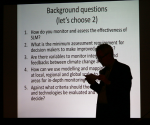The outcome from the UN Convention to Combat Desertification (UNCCD) 3rd Scientific Conference emphasizes that, inter alia, "human actions are a key driver of desertification, land degradation and drought, and a contributor to climate change.
Therefore, society must mitigate or reverse these stresses using innovative approaches to attain land degradation neutrality."
 12 March 2015: The outcome from the UN Convention to Combat Desertification (UNCCD) 3rd Scientific Conference emphasizes that, inter alia, “human actions are a key driver of desertification, land degradation and drought, and a contributor to climate change. Therefore, society must mitigate or reverse these stresses using innovative approaches to attain land degradation neutrality.”
12 March 2015: The outcome from the UN Convention to Combat Desertification (UNCCD) 3rd Scientific Conference emphasizes that, inter alia, “human actions are a key driver of desertification, land degradation and drought, and a contributor to climate change. Therefore, society must mitigate or reverse these stresses using innovative approaches to attain land degradation neutrality.”
The Conference, which was convened in the context of the fourth Special Session of the Committee on Science and Technology (CST S-4) of the UNCCD, developed recommendations for enhancing the contribution of science and technology, as well as traditional knowledge and practices, in addressing the vulnerability of biophysical systems and human livelihoods due to the combined impacts of land degradation and climate change.
Building on lessons learned from previous conferences, a large part of the Conference was structured around 15 parallel workshops that drew on poster sessions by participants to illustrate three main themes: diagnosis of constraints, responses and monitoring and assessment. Each workshop then developed scientific and operational recommendations for scaling up land-based adaptation, building on issues highlighted in the Conference Impulse Report, titled ‘Climate change and desertification: Anticipating, assessing & adapting to future change in drylands.’
CST Chair Uriel Safriel noted that the high ratio of time for discussion compared to presentations and lectures helped the Conference format to evolve into a “social process.” He assured delegates that the CST Bureau and the UNCCD’s Science-Policy Interface (SPI), which was established following the last Conference of the Parties (COP 11) in Windhoek, Namibia, in 2013, would “try to be innovative in making the outcome beneficial for the UNCCD.” He noted that the final outcomes will include a report with the main findings of the Scientific Conference and a policy-oriented outcomes document.
Presenting the Conference outcomes, William Payne, Chair of the Scientific Advisory Committee, said the Scientific Conference recognized that while “the very best modern science and technology” will be needed to succeed, reversing the stresses associated with the processes of land degradation and climate change ultimately requires a change in human behavior and attitudes regarding the use of land and other natural resources. Mariam Akhtar-Schuster, Member, SPI, highlighting key policy insights, stressed that “doing nothing is not an option,” and that all stakeholders must continue efforts to scale up land-based adaptation efforts through effective multi-stakeholder partnerships and collaboration. She said that, in addition to compiling the policy outcomes, the SPI will develop a policy brief for decision makers to facilitate implementation.
During its closing session on 12 March, the CST S-4 adopted the preliminary report of the Conference, which will be finalized by the CST Bureau and SPI for consideration at CST 12 and COP 12 in Ankara, Turkey, in October 2015.
In addition to the main programme, lunchtime and evening side events took place throughout the week. Among the topics covered were: introducing a proposed Global Land Outlook publication; operationalizing the UNCCD Scientific Knowledge Brokering Portal; supporting the implementation of the land degradation neutrality goal; developing a resilience assessment framework for agro-ecosystems; using satellite data to measure and monitor land degradation over time at multiple scales; advancing synergies among the three Rio Conventions; and preparing for COP 12 in Ankara, Turkey.
The Scientific Conference was organized by the Scientific and Traditional Knowledge for Sustainable Development (STK4SD) Consortium, under the guidance of the CST Bureau and the Conference’s Scientific Advisory Committee. The two meetings, which took place from 9-12 March 2015 in Cancun, Mexico, brought together approximately 300 participants, almost half of whom were from the scientific community. [IISD RS Coverage of CST S-4 and the UNCCD 3rd Scientific Conference] UNCCD Press Release 1] [UNCCD Press Release 2] [UNCCD Press Release 3] [UNCCD Press Release 4] [CST S-4 and Scientific Conference Website] [Scientific Conference Documents] [IISD Story on Impulse Report]